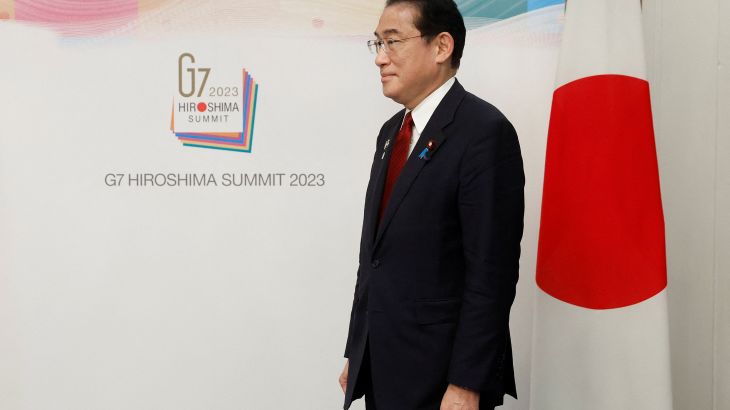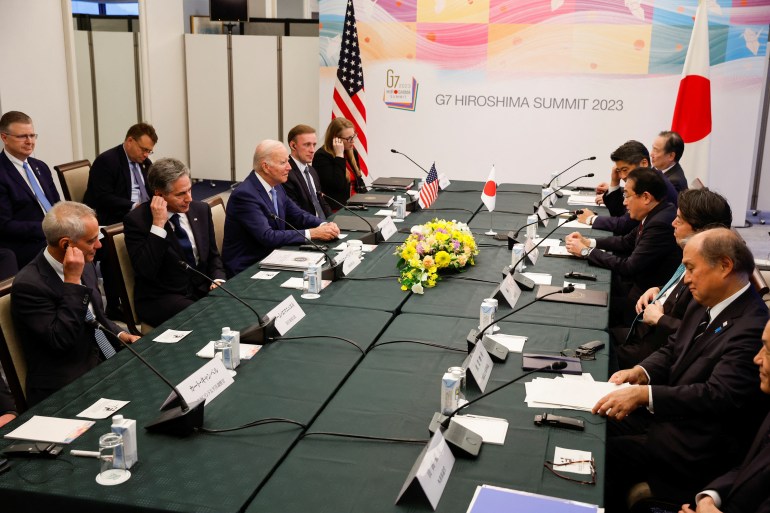Japan PM Kishida wants to abolish nuclear arms but build military
Kishida may become the leader most singularly responsible for cementing Japan’s turn away from decades of pacifism.

Hiroshima, Japan – To promote his vision of a world without nuclear weapons, Japanese Prime Minister Fumio Kishida took G7 leaders to the spot in Hiroshima where an atomic bomb was used against a civilian population for the first time.
Kishida may also end up being the leader most singularly responsible for cementing Japan’s turn away from decades of pacifism, as Tokyo embarks on a major military buildup with the backing of the United States’ nuclear umbrella.
Keep reading
list of 4 items‘I want our leaders to see what happened in Hiroshima’: Survivor
Scientists call on G7 to improve preparedness for next pandemic
G7 summit: Are Biden and Kishida climate walkers or just talkers?
The seeming contradiction reflects the evolving international role that Kishida’s Japan, the host of this year’s G7 summit, is seeking to chart amid an increasingly uncertain security environment.
China’s growing assertiveness in the region, including its claims to self-ruled Taiwan, and North Korea’s untrammelled development of nuclear weapons and ballistic missiles have unnerved Tokyo.
At the same time, questions about the long-term sustainability of US power in Asia have buttressed calls for Japan to take greater responsibility for its own defence.
In December, Kishida, a longtime opponent of nuclear weapons whose electoral seat is in Hiroshima, announced plans to double military spending over the next five years to 2 percent of gross domestic product, representing the biggest shake-up in the country’s security posture since World War II.
The beefed-up security strategy includes plans to boost the country’s cyberwarfare capabilities and buy US missiles capable of destroying enemy targets far from its shores.
“The alliance with the US remains central to Japan’s security policy but there is a recognition that this is no longer sufficient,” James D J Brown, associate professor of political science at Temple University in Tokyo, told Al Jazeera.
“Facing unprecedented insecurity and deeply concerned about a Taiwan crisis, Japan’s policymakers realise that the country must do more for itself in terms of security and must do more with other partners, especially the Quad countries and NATO members. For this reason, Japan is taking on a more active role in international affairs. The G7 summit is an opportunity to show this.”

Ukraine war
Under Kishida, Japan has taken by far the region’s strongest stand against Russia’s war in Ukraine, casting the conflict as a violation of the international rules-based order that upholds the peace and security of all countries, including his own.
Kishida has repeatedly linked the plight of Ukraine to the fate of Taiwan, which Beijing claims the right to “reunify” with the Chinese mainland – by force if necessary.
“The peace and stability of the Taiwan Strait is critical not just for our country, but for the whole international community,” Kishida told the Nikkei Asia magazine in an interview earlier this month.
“Our position has always been that the issue of Taiwan should be resolved peacefully through dialogue, and I believe the Group of Seven is united on this.”
Unlike other Asian countries that have sat on the sidelines or even expressed support for Moscow, Tokyo has sanctioned hundreds of Russian individuals and organisations and pledged to gradually phase out imports of Russian energy.
The Japanese government has also given more than $7bn to Ukraine and taken in about 2,000 Ukrainians displaced by the war, despite the East Asian country’s historical aversion to immigration.
In March, Kishida made a surprise visit to Ukraine, where Ukrainian President Volodymyr Zelenskyy hailed the Japanese leader as a “powerful defender of the international order” and “a longtime friend of Ukraine”.
‘Support of NATO’
Takahide Kiuchi, executive economist at the Nomura Research Institute in Tokyo, said while Kishida is a “very dovish person” by nature, the threat of a conflict over Taiwan has pushed Japan to bolster its security ties with like-minded countries.
“In that situation, Japan wants the support of NATO or the European countries,” Kiuchi told Al Jazeera. “So it’s a kind of exchange.”
In Hiroshima this weekend, Kishida is expected to work with the other G7 leaders to roll out new coordinated measures to further tighten the screws on Moscow.
US and Japanese officials on Friday told media outlets that Zelenskyy will travel to Japan to attend the gathering in person after earlier reports that the Ukraine leader would only join the talks via video link.
“The Japanese government feels genuine sympathy for Ukraine but, as with any policymakers, they are also thinking about their own national interests,” Brown said.
“There is the fear that if one ageing autocrat can throw caution to the wind and invade a neighbour, why not another? This is why Kishida regularly repeats that Europe today could be East Asia tomorrow. He is talking about Taiwan.”